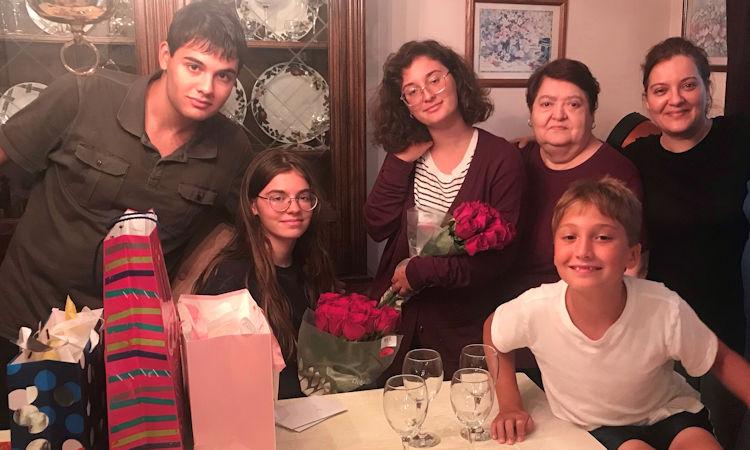
-
Understanding primary immunodeficiency (PI)

Understanding PI
The more you understand about primary immunodeficiency (PI), the better you can live with the disease or support others in your life with PI. Learn more about PI, including the various diagnoses and treatment options.
-
Living with PI
-
Addressing mental health
-
Explaining your diagnosis
- General care
- Get support
- For parents and guardians
-
Managing workplace issues
- Navigating insurance
-
Traveling safely

Living with PI
Living with primary immunodeficiency (PI) can be challenging, but you’re not alone—many people with PI lead full and active lives. With the right support and resources, you can, too.
-
Addressing mental health
-
Get involved

Get involved
Be a hero for those with PI. Change lives by promoting primary immunodeficiency (PI) awareness and taking action in your community through advocacy, donating, volunteering, or fundraising.
-
Advancing research and clinical care
-
Grants
-
IDF surveys
-
Participating in clinical trials
-
Diagnosing PI
-
Consulting immunologist
-
Clinician education

Advancing research and clinical care
Whether you’re a clinician, researcher, or an individual with primary immunodeficiency (PI), IDF has resources to help you advance the field. Get details on surveys, grants, and clinical trials.
-
Grants
A junior at Rutgers University, Victoria Medl takes classes like biology and organic chemistry, and when the hours of study and workload threaten to overwhelm her, Medl, who has primary immunodeficiency (PI), reminds herself why she chose the pre-med track.
“I always tell myself that I couldn’t imagine doing anything else. I really want to be a support system for other patients who have experienced the same things I have because PI is just so unknown, and there are so many uncertainties that come with it,” said Medl.
“A PI diagnosis can be a really scary thing, and if I can help treat and manage people’s PI, and, who knows, maybe even one day cure certain forms of PI, that would be my dream.”
Medl is considering board certification in both immunology and oncology. This summer, she is working in a Rutgers immunology lab studying the implications of the CD40L pathway in autoimmunity, specifically in the progression of lupus.
“There needs to be more physicians in the field who not only understand the patient experience but live it,” she said.
Medl has already started down the path of helping the PI community by serving as a volunteer for the Immune Deficiency Foundation (IDF). When the pandemic started, she and other teens and young adults banded together and planned online educational and social sessions, with guidance from IDF, to support youth with PI during a stressful and isolated time.
In the summer of 2022, when IDF Teen and Young Adult Escapes returned in person, Medl sat on a panel that answered parent questions related to supporting their children. Escapes provide teens and their parents, along with young adults, opportunities to network and build relationships while also learning how to transition from childhood into adulthood living with PI.

“We talked about school, navigating PI with college, making sure that you have healthy relationships with friends, family, and romantically, and the importance of communication,” said Medl, who is set to volunteer again at this year’s Teen and Young Adult Escape Weekend, scheduled for July 21-23 in Dallas.
“I’m looking forward to meeting some of the newer teens that have just been introduced to IDF and giving them a little more direction as to what the foundation is about and what the program is about, and hopefully, we can get more volunteers and future young adults leaders on board as well.”
Medl has lived with PI symptoms since infancy. She developed an allergy to milk and vomited frequently, which led to failure to thrive. By age 5, her digestion improved, but she continued experiencing chronic respiratory, sinus, and ear infections, and doctors diagnosed her with asthma. It wasn’t unusual for her to miss weeks of school.
“Throughout elementary school, I just had the reputation of being the sick kid,” said Medl.
At 14, Medl received a diagnosis of unspecified PI due to low immunoglobulin A (IgA) levels and low vaccine titers. She began treatment with immunoglobulin (Ig) replacement therapy and wore a mask to protect against infection. The measures reduced her infections to one to two per year, but social challenges remained.
“I was bullied a lot in school, especially during middle and high school, because I wore a mask during flu season or just throughout winter months when people were getting sick a lot,” said Medl.
“I had a couple of friends, but they kind of came and went, but then I met two people who became my best friends. It was important for me to find people who were compassionate and who could on some level understand what I was going through or, if not understand, just be supportive of me.”

Medl finds her greatest source of strength from her grandmother, Margit Varnai, who lives a few houses down from Medl’s parents and three siblings in Middletown, New Jersey. Medl’s grandmother cared for her while her parents worked, spending hours in the kitchen preparing different kinds of food to find ones that wouldn’t make her granddaughter nauseous. At 12, Medl moved in with her grandmother, who also has a chronic illness.
“My grandmother has been my role model for dealing with disability and illness. If it weren’t for her, I don’t think I’d be taking my diagnosis as well as I am now. We have a very nurturing relationship, and I don’t know what I would do without her,” said Medl.
“I think a lot of my optimism and the way I look at life comes from her and her struggle with her health as well. She has been my rock in helping me deal with my own illness.”
Though the infections have cleared up, Medl is now coping with joint and muscle pain caused by amplified musculoskeletal pain syndrome (AMPS), diagnosed in April 2023. Medl said the condition is caused when nerves fire incorrectly and produce sensations of pain to non-painful stimuli, causing a buildup of lactic acid and a decrease in blood flow to bones. She also required surgery for hip dysplasia.
When the pressures of her health get to be too much, Medl finds comfort and solace in drawing and playing the piano.
“It’s definitely something that’s gotten me through a lot of hardships and given me stress relief. It’s more of a grounding exercise for me. Whenever I’m feeling anxious or stressed, I always have my art and music to rely on,” said Medl.

The 19-year-old can also turn to her friend network in the PI community, relationships that started when her immunologist referred her family to IDF. After attending a few local dinner meetings where she connected with others diagnosed with PI, she joined the IDF teen events. She encourages younger people to take advantage of what IDF has to offer.
“I think that IDF has such a welcoming community that you will fit right in and feel like you immediately belong and become part of a beautiful family,” said Medl.
“If you are feeling a little bit lost or you’re having trouble keeping relationships or making friends, I think this is a wonderful opportunity to branch out of your social circle, go out of your comfort zone, and meet a lot of new people who can likely become lifelong friends.”
Related resources
Sign up for updates from IDF
Receive news and helpful resources to your cell phone or inbox. You can change or cancel your subscription at any time.





The Immune Deficiency Foundation improves the diagnosis, treatment, and quality of life for every person affected by primary immunodeficiency.
We foster a community that is connected, engaged, and empowered through advocacy, education, and research.
Combined Charity Campaign | CFC# 66309




